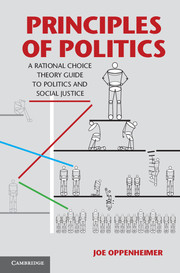Book contents
- Frontmatter
- Contents
- Propositions and Corollaries
- Tables
- Figures
- Sidebars
- Definitions
- Preface
- Overview of the Book
- Acknowledgments
- Introduction: Politics, Universals, Knowledge Claims, and Methods
- Part I The Logic of Collective Action
- Part II Collective Choice
- Part III Political Institutions and Quality Outcomes
- Part IV Social Justice, Choice, and Welfare
- Chapter 8 The General Problem of Collective Welfare and Choice
- Chapter 9 Voting Rules
- Chapter 10 Social Welfare and Social Justice: A Partial Integration
- Conclusions
- Bibliography
- Name Index
- Subject Index
Chapter 8 - The General Problem of Collective Welfare and Choice
Published online by Cambridge University Press: 05 August 2012
- Frontmatter
- Contents
- Propositions and Corollaries
- Tables
- Figures
- Sidebars
- Definitions
- Preface
- Overview of the Book
- Acknowledgments
- Introduction: Politics, Universals, Knowledge Claims, and Methods
- Part I The Logic of Collective Action
- Part II Collective Choice
- Part III Political Institutions and Quality Outcomes
- Part IV Social Justice, Choice, and Welfare
- Chapter 8 The General Problem of Collective Welfare and Choice
- Chapter 9 Voting Rules
- Chapter 10 Social Welfare and Social Justice: A Partial Integration
- Conclusions
- Bibliography
- Name Index
- Subject Index
Summary
To combine the discussion of collective welfare and collective choice in one chapter is to admit an aspirational bias: we would like collective choice to promote collective welfare. Trying to answer, “What should be the collective outcome?” directly links to the question, “What is in the interest of the group?” (Lest anyone think this question of little import, reflect on the number of wars that have been fought, and their associated number of deaths, based on the claim that they were in a nation’s interest.) So the two topics, collective choice and collective interest, are intimately related: if there were no question of the “interest of the group” there would be little reason to consider collective choice. Further, as demonstrated by Kenneth Arrow, the two topics share problems of analysis.
SETTING UP THE PROBLEM
At the heart of both the welfare and choice problems lies the difficulty of aggregation. In one case it is aggregating the well-beings of a collection of individuals into a notion of collective well-being, and in the other it is the aggregation of individual decisions into a binding group decision. As noted in the discussion of Figure 43 (page 188), one main justification of democratic political institutions involves the presumed positive relation between the welfare of the citizens, the outcomes they would choose, and the welfare of the group. Thus, the two subjects, social choice and social welfare, are inexorably intertwined for democrats. Substantial empirical research (see page 92) has shown numerous positive indicators of democracy’s superiority, but understanding why democracy ‘works” runs into difficulties.
- Type
- Chapter
- Information
- Principles of PoliticsA Rational Choice Theory Guide to Politics and Social Justice, pp. 193 - 210Publisher: Cambridge University PressPrint publication year: 2012



